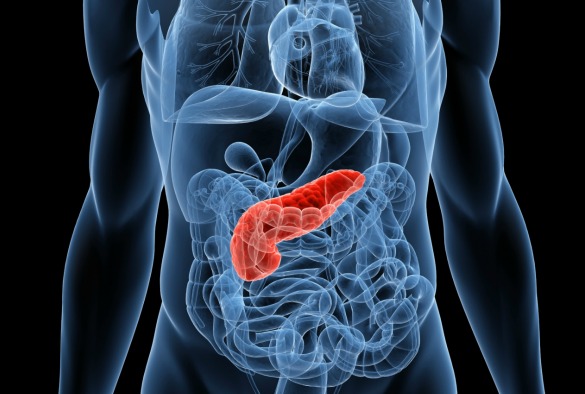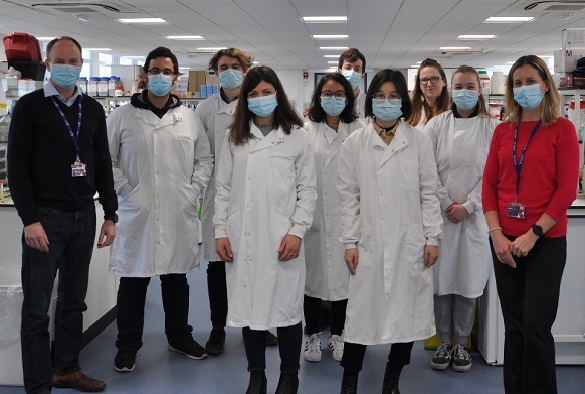
A new Liverpool led study, published in Gut, has identified how immune cells in the body can promote the regrowth of cancer cells after chemotherapy withdrawal. These findings will help improve the effectiveness of chemotherapy in patients with certain cancers.
Background
Pancreatic ductal adenocarcinoma (PDAC) is the most common form of pancreatic cancer, making up more than 80% of cases. Pancreatic cancer develops in the pancreas but cancer cells can spread aggressively to distant sites in the body – a process called metastasis – meaning patients can get metastatic – or secondary – tumours. Cytotoxic chemotherapy is the standard care treatment for patients in advanced stages of the disease. The understanding of how these metastatic tumours react to chemotherapy and its role in metastatic disease progression post-treatment is currently poor.
Aim and method
Working with partners, a multidisciplinary team at the University of Liverpool’s Department of Molecular and Clinical Cancer Medicine led by Professor Michael Schmid and Dr Ainhoa Mielgo, aimed to gain a better understanding of this process by using flow cytometry and mass cytometry on experimental PDAC liver metastases models. These processes allowed the researchers to measure multiple parameters at the single-cell level in a very short time. This provided a detailed analysis of complex interactions at cell level and mechanistical insights on whether and how chemotherapy affects the metastatic tumour microenvironment.
Findings
The researchers found that chemotherapy induces an initial infiltration of immune cells (macrophages) into the liver and activates cancer killing cells (cytotoxic T cells) leading only to a temporary restraining of metastatic disease progression. However, the cessation of chemotherapy induces the recruitment of another type of immune cells (neutrophils) to the liver, resulting in increased metastatic growth. Disruption of this recruitment inhibits metastatic growth.
‘Important discovery’
Dr Mielgo, University of Liverpool’s Department of Molecular and Clinical Cancer Medicine, said: “Our findings explain how chemotherapy not only affects the cancer cells but also the immune response against cancer cells that have spread to the liver. This is an important discovery that provides a translational opportunity to improve the effectiveness of chemotherapy in patients with liver metastasis.”
Professor Schmid, University of Liverpool’s Department of Molecular and Clinical Cancer Medicine, said: “We are very excited about this study and its clinical implications. This is a multidisciplinary study that has been possible through team science and the leverage of our in house scientific and clinical expertise in translational cancer research and the state of the art technologies at the University of Liverpool Liverpool Shared Research Facilities – University of Liverpool”
Optimising effective collaborations
Professor Christian Ottensmeier, Director of Clinical Research at Clatterbridge Cancer Centre, said: ”The work is a wonderful example of our initiative to optimise effective collaborations between scientists and clinicians undertaken at the University of Liverpool and the Clatterbridge Cancer Centre. The study improves our understanding of how metastatic tumours react to chemotherapy and will provide the rational for medical oncologists to improve current standard care of treatment.”
Professor Sonia Rocha, Dean of the Institute of Systems, Molecular and Integrative Biology added: “The study is an excellent reflection of our existing research strengths at our Institute. Our Institute combines a wide spectrum of research expertise, from molecules to clinical medicine, and by combining that knowledge, we can improve current treatments that will benefit cancer patients.”
Co-first authors of this study are PhD students Gaia Bellomo and Carolyn Rainer. This study has been performed in collaboration with clinical colleagues, experts in pancreatic cancer (Halloran, Ghaneh, Palmer), colorectal cancer (Jones, Vimalachandran), as well as bioinformatician (Hammond), and collaborators from the CRUK Beatson Institute (Morton).
 Tumour Microenvironment Group
Tumour Microenvironment Group
The full study, entitled ‘Chemotherapy-induced infiltration of neutrophils promotes pancreatic cancer metastasis via Gas6/AXL signalling axis’, can be found here.